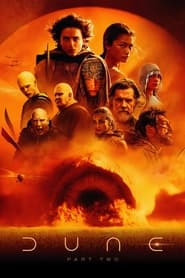Can you imagine how DP Greig Fraser must have felt when he was not only asked to film the sequel to the first Dune, but Villeneuve agreed to let him have a extended black-and-white sequence featuring insanely expressionist chiaroscuro lighting in order to depict the Harkonnen colosseum… in the style of Leni Riefenstahl's Triumph of the Will (1935)?
Anyway, historical epics seem to require an extremely careful and finely-judged handling of the sense of time within the world they are depicting, but there were many moments in Dune: Part Two where this specifically becomes a problem for the film, if not the entire story arc. For example, there were many times when we are shown the Fremen skirmishing with the Harkonnens, but as we were not shown any of the Fremen's tactics (or got any sense of their broader strategy), it was unclear whether the fight we were seeing had any meaning beyond looking cool. To be clear, I'm not saying that it's a plot hole that we never saw them learning how to use, say, the under-sand breathing tubes, for example, but the viewer here really does need to have some sense of whether things are going well or not. In Dune, specifically, failures in this area become a serious problem in the series' overarching narrative if we don't know whether what we are seeing is depicting things happening simply according to plan, or if we are being shown an example of Paul's extraordinary abilities. Maybe there's a hypothetical or future re-cut that solves this problem, but seemingly only James Cameron has the permission and clout (and the money) to push past the three-hour mark these days.
I enjoyed this a lot more than the previous instalment, but it still left me out in the cold. This sequel let itself down in a new and different way, specifically in that Paul's purported fulfilment of prophesied events was continually undercut by jokes, wry remarks or smirks. Frank Herbert's original novels are incredibly and quite unavoidably self-serious, and I really don't think they can really incorporate the kind of Marvel-lite "Well, that just happened!" insincerities after Paul fulfilling some part of a prophecy (which, incidentally, we never learn in full…) without it feeling tonal off. There's a lot wrong with David Lynch's Dune (1984), of course, but at least the film believes it is taking the source material seriously… even if the result borders on camp.
Oh, yeah, needless to say it's absolutely unreal to watch a film about an absurdly Muslim-coded desert people fight back against systematic oppression in 2024.
The Harkonnens are surely colonial bad guys but in a cartoony, indirect way, while the presentation of the Fremen as easily swayed religious fundamentalists is more about keeping the plot moving than interrogating dogma. Yes, the story is dark, but not in any particularly complex ways; its grimness is more like a factory setting. […] [I]t could be taken for a masterpiece, and yet its perfection is more dutiful than exhilarating. There’s definitely more story to be told, and while Villeneuve has proved himself as the right guy to tell it, it’d be nice to think (or imagine) that a filmmaker hailed for his consistency still has some surprises up his sleeve. Until then, the wait for Part Three, however long, will be steeped in ambiguous feelings—not quite dread, but not exactly excitement, either.
— Adam Nayman (The Ringer)
I don’t think the Fremen are a reflection of any single people but rather a window into shared patterns of exploitation and resistance that reflect distinct Indigenous and colonial histories. [H]erbert, in braiding these various histories, clearly sought to expose the resonances between them while trying to draw out something new. [V]illeneuve’s film adaptations of Dune winnow away much of the ecological texture of Fremen practice. But they also thicken the integrity of the culture itself, developing their native tongue, Chakobsa (only loosely sketched by Herbert), into a fully functional language; turning their sand walk into a graceful stride that echoes the quasi-Arabic characters Chakobsa is written in; and vastly expanding the aural texture of the novel, the rhythms of its desert landscapes, and the movements of its denizens.
— Devin Griffiths (Los Angeles Review of Books)
Did Obama enjoy Denis Villeneuve’s Dune: Part Two (2024) for its widescreen spectacle or as a cautionary tale about the ascent of a false prophet whose flaws are recapitulated as strengths by a constituency hoping to spice up a desultory, dynastic political narrative?
— Brendan Boyle and Adam Nayman (Los Angeles Review of Books)
Synopsis: Follow the mythic journey of Paul Atreides as he unites with Chani and the Fremen while on a path of revenge against the conspirators who destroyed his family. Facing a choice between the love of his life and the fate of the known universe, Paul endeavors to prevent a terrible future only he can foresee.

